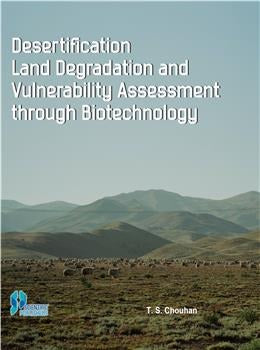DESERTIFICATION LAND DEGRADATION AND VULNERABILITY ASSESSMENT THROUGH BIOTECHNOLOGY
DESERTIFICATION LAND DEGRADATION AND VULNERABILITY ASSESSMENT THROUGH BIOTECHNOLOGY is backordered and will ship as soon as it is back in stock.
Couldn't load pickup availability
Genuine Products Guarantee
Genuine Products Guarantee
We guarantee 100% genuine products, and if proven otherwise, we will compensate you with 10 times the product's cost.
Delivery and Shipping
Delivery and Shipping
Products are generally ready for dispatch within 1 day and typically reach you in 3 to 5 days.
Author: T.S. Chouhan
Publisher: Scientific Publishers
Language: English
Edition: 1st Edition (2024)
Binding: Hardbound
Pages: 290
Size: 6 x 9.30 x 0.75 inches
Weight: 530 g
Book Type: Reference Book
About the Book
This reference work offers an in-depth analysis of desertification—a pressing environmental and socio-economic challenge affecting arid, semi-arid, and sub-humid regions. It explores the ecological degradation of plant, animal, soil, and water resources, with an emphasis on fragile ecosystems where the damage may become irreversible.
Key highlights include:
-
Causes and consequences of land degradation in dryland regions
-
Socio-environmental impacts of desertification on biodiversity and human livelihoods
-
Role of biotechnology in reversing desertification and improving land productivity
-
Applications of biotechnology in agriculture: enhancing crop yields, increasing nutritional value, and improving plant resistance to pests, diseases, and extreme weather
-
Advances in plant genetics and molecular biology for sustainable land and resource management
This book is especially relevant for:
-
Students and researchers in environmental science, agriculture, and biotechnology
-
Policymakers and professionals working in land restoration and climate resilience
-
Academicians and planners addressing sustainable development in dryland regions
A vital resource for understanding the intersection of ecological degradation and technological innovation in land restoration.





